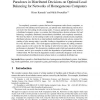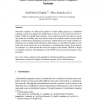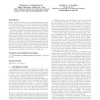100 search results - page 1 / 20 » Paradoxes in distributed decisions on optimal load balancing... |
JACM
2002
13 years 4 months ago
2002
In completely symmetric systems that have homogeneous nodes (hosts, computers, or processors) with identical arrival processes, an optimal static load balancing scheme does not in...
COR
2006
13 years 4 months ago
2006
Numerical examples of a Braess-like paradox in which adding capacity to a distributed computer system may degrade the performance of all users in the system have been reported. Un...
NETWORKING
2004
13 years 5 months ago
2004
Abstract. In computer networks (and, say, transportation networks), we can consider the situation where each user has its own routing decision so as to minimize noncooperatively th...
SIGMETRICS
2011
ACM
12 years 7 months ago
2011
ACM
Energy expenditure has become a significant fraction of data center operating costs. Recently, “geographical load balancing” has been suggested to reduce energy cost by explo...
IPPS
2002
IEEE
13 years 9 months ago
2002
IEEE
Efficient load balancing algorithms are the key to many efficient parallel applications. Until now, research in this area has mainly been focusing on homogeneous schemes. Howeve...



